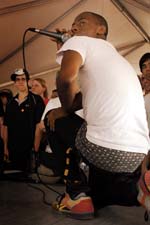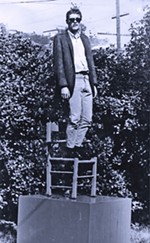Lunacy and Sorrow
Attaining balance between David Berman and his Silver Jews
By Doug Freeman, Fri., Sept. 19, 2008
What was not but could have been,
Was my obsession way back when.
Now I just remember this:
What is not but could be if.
Silver Jews' sixth Drag City album, Lookout Mountain, Lookout Sea, opens with "What Is Not but Could Be If," odd, because for the past 15 years, David Berman's vision has been anything but expectant. Prophet of slacker paralysis, poet laureate of the passive underachievers, Berman crafts songs that contort in cryptic aphorisms of brutal self-deprecation and solipsistic self-awareness. His mumbling narratives push in constant disconnect from the world around him and history's endless failures, taking solace in fatalistic irony and affirmation of remaining outside it.
Berman formed Silver Jews in 1989 with Bob Nastanovich and Stephen Malkmus, whose later success with Pavement both helped and overshadowed Berman's band throughout the 1990s. He also didn't do much to distinguish Silver Jews from a Pavement side project: The songwriter never toured and became an increasingly elusive figure. Berman's albums seemed like missives from an abstract abyss, wit and playfulness progressively shaded with a darker disillusion even as his songs reassured.
By the release of 2001's Bright Flight, Berman was locked in a spiral of depression and drug abuse, and though the public was unaware, the estranged thrust of songs such as "Horseleg Swastikas" retrospectively reveal the struggle: "And I wanna be like water if I can, 'cause water doesn't give a damn." Berman's detachment culminated in a 2003 suicide attempt: a handful of pills and a crack pipe in a Nashville hotel room.
2005's Tanglewood Numbers was more than a comeback album, however. It expressed a decidedly resurrected world-view. His songwriting was still rifled with poetic, disaffected statements, but they seemed directed at something bigger than himself. Berman even embarked on his first tour in support of the disc. Lookout Mountain moves even further in establishing Berman's new outlook, daring to gaze forward rather than down. In the final lines of the LP's opener, he offers, "We could be crossing this abridged abyss – into beginning." Via e-mail, Berman talks about keeping his balance.
Austin Chronicle: I read a quote recently where you said you wanted the new album to be "useful." What does that mean, especially in relation to your past work, or even art in general?
David Berman: Including the chord charts and lyrics in the liner notes increases a CD purchase's utility by 100% minimally. So I am very happy about having tripped open an idea in plain clear sight. I also spend a lot of time reading about wisdom and stupidity, in history, in sociology, and in the longtime passed-down knowledge of the (sometimes) anonymous scribes.
AC: How has your decision to begin touring and step more into the public eye since Tanglewood Numbers influenced the outlook of the new album?
DB: Touring socializes me. At home, I work a lot, and in some ways have chosen work and marriage over friends, believing, as I do, that out of work, friends, and marriage, I can only do two well. Now you can calculate what suffers on tour. Tour is work and friends, so marriage suffers, in the sense that on tour you become warriors against the tide of traveling mishaps – no days off, long drives, occasional intra-band hostilities, etc. But back to that first answer, touring floods me with friends.
AC: One of the marvels of your songwriting is its balance – to borrow a phrase from John Irving – of "lunacy and sorrow." Do you consider those elements inherently tied or reflective of one another?
DB: If lunacy is read as "the comic" and sorrow as "the tragic," you can see how mainstream and monolithic the modes I work in are. When I get it right, balance is attained.
AC: In battling through your past depression and addictions, how much was your earlier music and poetry a product of, reaction to, or even an escape from those struggles?
DB: It's funny that no one has asked me to interpret the work itself through hindsight. What you're asking is something I haven't analyzed but need to.
AC: Having broken through that period, do you feel you have a different understanding of or relationship to the art you're creating now?
DB: My relationship to the art is more intimate, my composition more pragmatic. I try for kindness and wisdom. I pray for kindness and wisdom.
AC: This album feels like a culmination of the more playfully optimistic tone flirted with on Tanglewood Numbers. Is there a progression for you between the two?
DB: This is the first of my records to face the world. The expression on that face is what's changed on Lookout Mountain, Lookout Sea.
AC: Perhaps due to your recent cornea transplant, this album plays with a lot of tropes of seeing, looking at things in new ways, recognizing new patterns. Was there a sense for you of consciously looking forward or embracing new possibilities?
DB: For a couple of years I've been practicing a certain method. It can be compared to the Seinfeld episode about "Opposite George," where everything goes right for the character when his decision-making process is flushed out and reversed. I throw myself curveballs. I make myself.
AC: You've said that you haven't watched the Silver Jew film because there are things you would want to change but can't. Similarly, you seem to eschew – and correct me if I'm wrong – looking back intensely on your own past.
DB: I think this is true. For me, creation might even be a way to fill the space where my past should be. I didn't have a tragic childhood, but it was grindingly painful nonetheless, and I am mostly independent of family things.
AC: You've also said you like occupying the role of the outsider, whether in Judaism or music. Why is that an important space for you to occupy?
DB: Autonomy. I've got to have it, keep it, and defend it.
Silver Jews tangle up in Emo's Friday, Sept. 19, with James Jackson Toth and Charles Potts Magic Windmill Band.
*Oops! The following correction ran in the September 26, 2008 issue: A printing error in last week's paper bungled the bylines of staff writer Jordan Smith, author of cover story "Iraq Comes Home," News, and contributor Doug Freeman, author of "Lunacy and Sorrow," Music, both Sept. 19. Food and Music section headings in that issue were garbled as well. The Chronicle is bummed about the errors.











